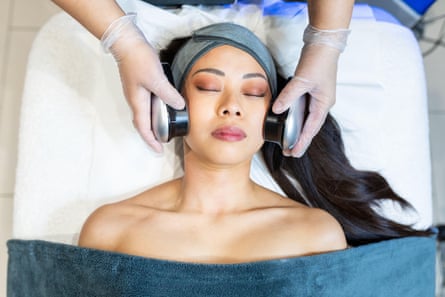
If you search for “beauty spells” on Etsy, the e-commerce platform that specializes in handmade, personalized and vintage items, you get more than 11,000 results. They range in price from under a dollar to over $1,100 – the latter for a spell offering “ultimate beauty” and social media fame. The vast majority cost $5 to $20. Some promise same-day results, while others claim to be permanent.
For $8.96, I purchase a “bewitching beauty spell” to be cast in my name by the professionals at Crystal Conjure Magic. It promises to transform me into “a magically beautiful woman who has a hypnotic charm and supreme confidence”, instead of a regular 32-year-old woman who has mood swings and hasn’t settled on a skincare routine. I enter my credit card information and wait for the supernatural to do its work.
I don’t feel the magic immediately, but I do get an email about it. The next day, I receive a message from the vendor informing me my spell has been cast. It includes links to four PDFs: an overview of the spell; an introduction to the 10 laws of White Magic (No 3: “White Magic works through the subconscious of the buyer”); a file called What’s Next? Making Spells Work (ver. 2.0); and the seller’s November spells sale catalogue, which includes spells to banish toxic co-workers and one to “get organized”.
I go to the bathroom to stare in the mirror and inspect myself for signs of magical enhancement. Everything looks the same. All the basic face bits – nose, chin, chickenpox scar above right eyebrow – are present and accounted for. Anticlimactic, but I had expected that. Anyway, according to the documents, results could take weeks to manifest and might potentially be thrown off course by something called the Celestial Wind.
But even if the magic does work, it will not suddenly erase my flaws. “The beauty spell does not affect your physical appearance. It can’t. We’re not plastic surgeons,” says Henry Mason, 74, the owner of the Crystal Conjure Magic page on Etsy, and of the store Crystal Vaults in Bunnell, Florida.
Magic, he says, works from the inside out. First, you feel more beautiful. Then, because you feel beautiful, you act as if you are beautiful. And because you act like you are beautiful, people treat you like you’re beautiful.
I am moved by the wholesomeness of this explanation, but also find myself wishing the spell would address the monthly breakouts along my jawline.
Initially, Mason’s Etsy shop only sold crystals and elixirs, but he started offering spells in 2022 after noticing other vendors doing it. Demand quickly grew. Mason, a magician and a member of a group called the Alchemy Guild, says that he and a colleague cast up to 30 spells a day, most of them based on “medieval European magic”. Depending on the complexity of the spell, casting can take 5 minutes or 2 hours.
There are over 600 different spells for sale on Crystal Conjure Magic, but Mason expects that by April that number will be over 1,000. (He recently developed a new spell to get a person to pay back money they owe you.) The spell I purchased is a popular item, with over 2,200 reviews. “Today I had many people looking at me in the shopping centre,” reads one. “I have been receiving a lot of male attention lately,” says another.
Though buying spells on a website where you can also buy personalized keychains is relatively new, humans have been turning to the supernatural to enhance our appeal since we first developed the ability to yearn for another.
“Love spells are more common than beauty spells, but they overlap because obviously the point of a love spell is very often to get someone to find you attractive,” says Dr Catherine Rider, associate professor in medieval history at the University of Exeter, and author of the book Magic and Religion in Medieval England.
According to Rider, love spells date back at least to ancient Greece and Rome. In medieval Europe, the lovelorn might wear a special amulet or hire someone to perform an elaborate spell. While it’s difficult to know exactly how widely they were used, Rider says that records from the late middle ages suggest that the use of love magic was “quite prevalent”.
These spells have likely remained popular because, like a lot of magic, they address a basic human anxiety. “Nearly everyone’s been in a situation where maybe they’ve liked someone who hasn’t liked them back, or they’ve wanted to be more attractive or desirable,” Rider says.
For all his metaphysical qualifications, Mason is clear-eyed about how his spells work. “We are giving [the buyer] what they are looking for,” he says. “They’ve got an issue and they want somebody to listen, and they want something that they can do to make themselves feel better. They want a reason to believe, and we give them that.”
I suggest this sounds like a placebo effect, and Mason heartily agrees, saying that phenomenon is “incredibly powerful”. What is his definition of magic then? He thinks for a minute. “If you think you feel better, you do.”
“It’s certainly not a classic situation where one would invoke placebo effects,” says Dr Matthew Burke, a cognitive neurologist at the University of Toronto who has researched the neurobiology of placebo effects.
Placebo effects in a medical context, he explains, are the therapeutic benefits one might get from the context surrounding a treatment rather than the treatment itself. For example, in a clinical trial for psychiatric illness where all patients are treated the same, but some are given a sugar pill instead of a real pill, the patients who receive sugar pills often still see an improvement of their symptoms. “The positive expectation of getting better changes the brain in meaningful ways,” Burke says.
When a person thinks something good is going to happen, reward centers in their brain are activated and stress response centers are deactivated. For some conditions, these changes are enough to produce a noticeable improvement. But not all placebos work for all people. As Burke notes, in order to believe something will help you, you have to believe it works.
“Different healing rituals and treatments will induce a greater placebo effect in some people than others,” he says. For some, that may be a beauty spell. For others, it may be some kind of new treatment at a medspa with tasteful pastel-colored decor and the sheen of medical legitimacy.
So one of the essential ingredients in a beauty spell is something you actually can’t buy: belief. Lots of vendors warn that a spell will only work if you believe it will, which sounds pretty convenient for them. Spell didn’t work? You must not have believed enough.
I am a fan of the woo-woo. I know the minutiae of my astrological chart as well as the astrological charts of those closest to me. I love tarot and crystals line my windowsill. Soon after we started dating, I made my boyfriend go with me to a psychic who predicted that I would get a cold soon – I didn’t.
But when I purchase my beauty spell, I’m not sure I believe in it. My reservations don’t have anything to do with the supernatural. Do I truly think magic can make you feel more beautiful? I don’t know. Mostly, I realize I’m not sure what I want from the spell. There was a period in my life when all I wanted was to be more attractive in a mass-market, Abercrombie catalogue sort of way, because that seemed to be what society expected of young women.
Now, I have a comfortably neutral relationship with my appearance. Sometimes I see a photo of me that is so unflattering I wonder whether I’ve unwittingly wronged a powerful and vengeful god. Other times, I’ll glance in the mirror and worry that, for safety reasons, I should warn others not to gaze directly at me, lest my incandescent allure fry their retinas. But the vast majority of the time I look at myself and think, “This is basically fine.”
So I’m not sure how a successful beauty spell would change my life. I think about it for days. In the guide for Making Spells Work, I’m encouraged to “get out there” and “change things”. As I watch myself move through the world – ordering coffee, walking my dog, working on my couch, hanging out with friends – I wonder what I would do differently if I felt more gorgeous. Are there ways I’m subconsciously holding myself back because I am “basically fine”?
Only one thing comes to mind: if I felt more beautiful, maybe I’d post more seductive selfies to Instagram. Then I remember that the main reason I don’t do that isn’t because I don’t feel hot enough, but because I’d feel weird about my sweet family members who follow me seeing my bedroom eyes.
Days after my spell has been cast, I look in the mirror and see no change, but that feels OK. It’s refreshing to be reminded that you’re comfortable with yourself, especially when so many commercial forces are dead set on making you feel inadequate. Maybe that’s not magic, but it certainly feels worth $9.
BOTTOM LINE
How much did it cost? $8.96.
Did it work? It didn’t make me look any worse.
Would I do it again? Probably not. I’m not sure whether I believe in magic, but repeatedly inviting strangers online to cast spells for you seems like testing fate.
Did it fix me? No, but the thought exercises it inspired were more healing than I expected.
Overall rating: Three out of five shimmering orbs of positive energy.



